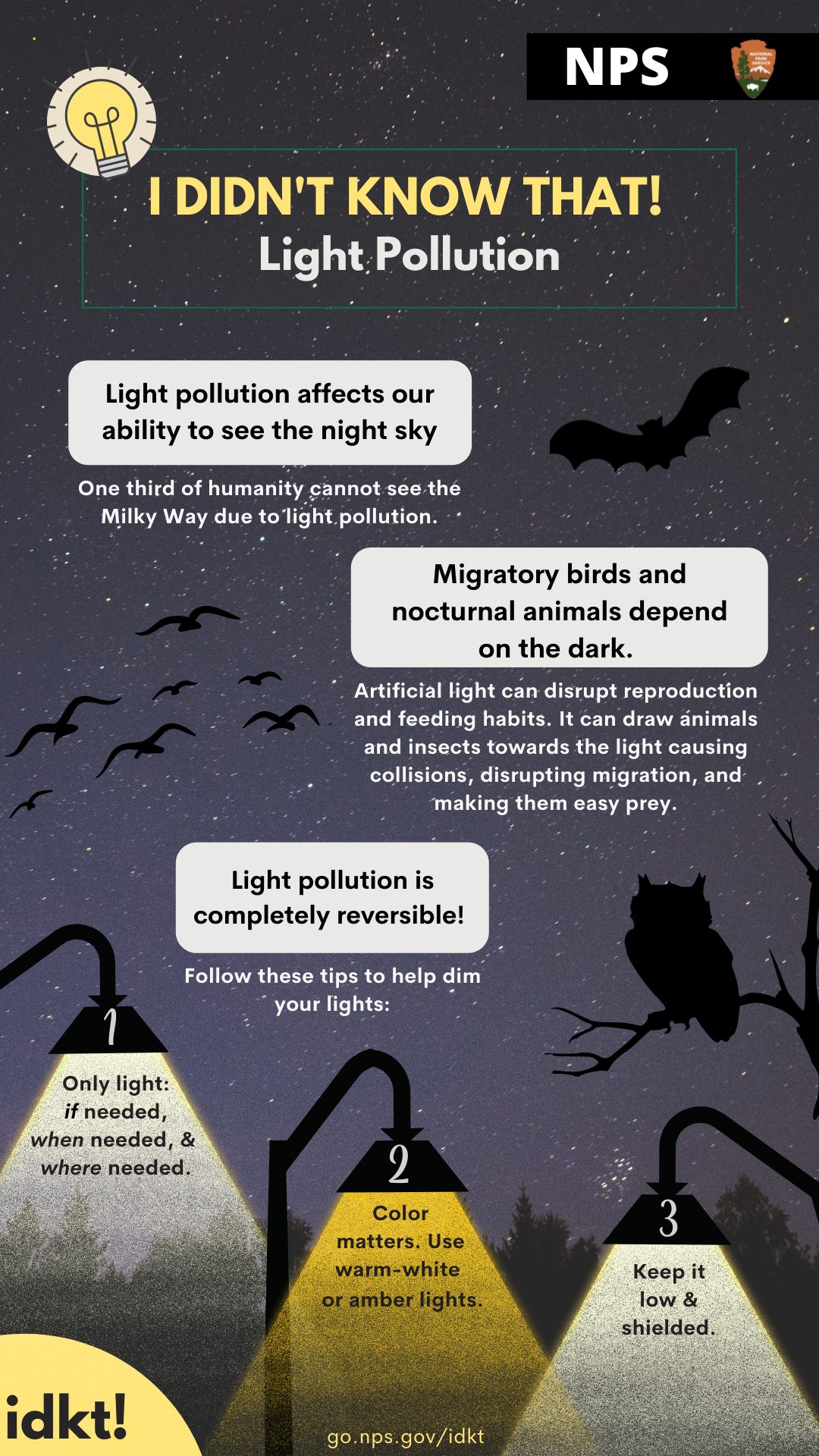Last updated: December 1, 2023
Article
I Didn't Know That!: Light Pollution

You’re having a quiet evening at home when all of a sudden... the lights go out! You take a peek outside and see that your neighborhood—normally filled with house lights, streetlights, and more—is suddenly dark. That’s when something catches your eye. Looking up into the sky you see something you don’t typically see. A splash of thousands of stars across the sky—the Milky Way.

NPS / Neal Herbert
Effects of Light Pollution
The obvious effect of light pollution is our inability to see the night sky and the loss of that feeling of awe and wonder when looking up at the stars. The not-so-obvious effects are being uncovered by natural resource scientists who are seeing wide-ranging effects on nocturnal (awake at night) wildlife and even diurnal (awake during the day) wildlife.

Photo: CSU / Ron Bend
Nocturnal animals and migratory animals depend on darkness. Artificial light can disrupt reproduction and feeding habits. It can draw sea turtle hatchlings away from their oceanic destination. Artificial light also has a major impact on migratory birds. Light from cities attracts birds, throwing them off-course from their destination or causing them to collide with illuminated buildings or circle until exhausted and emaciated. Millions of birds die this way each year. Additionally, migratory birds get clues from their surroundings on when it’s time to migrate. Artificial light can distort these natural signals causing birds to migrate too early or too late.
What You Can Do
The uplifting part of light pollution is that it is completely reversible. All it takes is for the lights to go out. Knowing that, it really is possible for everyone to make a difference by following these simple tips to dim your lights:
-
Light only if needed. Think about if you really need or use your current lighting.
-
Light only when needed. Install timers or motion sensors.
-
Light only where needed. Shield lights and direct them down. Shades, blinds, and curtains can reduce the amount of light that escapes your home. Learn more about what you can do to reduce unwanted lighting impacts.
-
Color matters. White and blue lights affect wildlife more than warmer colors. Use warm-white or amber light.
-
Use the minimum amount of light needed. Can you get by with fewer lights or lower wattage light bulbs? Try it out!
-
Use energy-efficient lights. Energy efficient lights also help reduce your carbon footprint.

Pass It On!
Did you learn something new? Pass it on! Protecting our night skies is a job for us all, but there’s no way for everyone to be an expert in everything. That’s why sharing knowledge is so important! The next time you see a neighbor install a non-dark-sky-friendly light, you can fill them in and assure them it’s ok to admit — “I didn’t know that!”
Download or screenshot this card to share with a friend or help you remember why dimming your lights is so important. Thank you for helping protect dark night skies and the animals that depend on them with us!
Want to learn more? Become a Junior Ranger Night Explorer and get acquainted with the dark.
Check out other I Didn't Know That! topics.
Text description for I Didn't Know That! Light Pollution graphic.
Light pollution affects our ability to see the night sky. One third of humanity cannot see the Milky Way due to light pollution.
Migratory birds and nocturnal animals depend on the dark. Artificial light can disrupt reproduction and feeding habits. It can draw animals and insects towards the light causing collisions, disrupting migration, and making them easy prey.
Light pollution is completely reversible! Follow these tips to help dim your lights:
-
Only light if needed, when needed, and where needed.
-
Color matters. Use warm-white or amber lights.
-
Keep it low and shielded.
